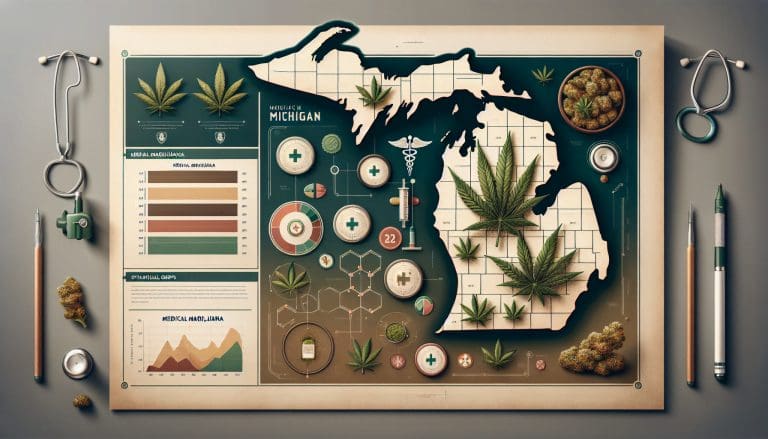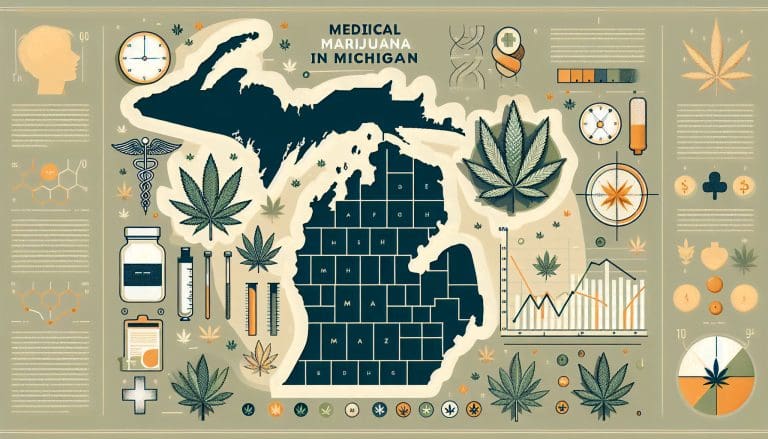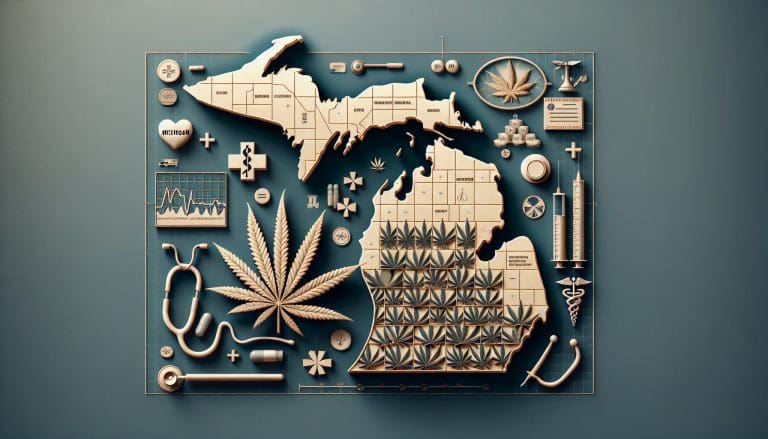Your Guide to Managing Your Michigan Medical Marijuana Card
As a resident of Michigan, you have the privilege of accessing medical marijuana for various health conditions. However, to do so, you need to manage your Michigan Medical Marijuana Card effectively. This guide will provide you with all the necessary information to ensure you stay compliant with the state’s regulations.
Understanding the Michigan Medical Marijuana Card
The Michigan Medical Marijuana Card is a state-issued identification card that allows patients with specific medical conditions to purchase, possess, and use medical marijuana. The card is issued by the Michigan Department of Licensing and Regulatory Affairs (LARA).
Can I Replace My Michigan Medical Marijuana Card?
Yes, you can replace your Michigan Medical Marijuana Card if it gets lost, stolen, or damaged. You need to contact LARA and follow the necessary procedures for replacement.
Do I Need to Report a Lost or Stolen Michigan Medical Marijuana Card?
Yes, it’s crucial to report a lost or stolen Michigan Medical Marijuana Card immediately to prevent misuse. You can report it to LARA and request a replacement card.
How to Get a Replacement Medical Marijuana Card in Michigan
To get a replacement card, you need to submit a written request to LARA. The request should include your name, date of birth, and address. You also need to explain the reason for the replacement request.
Cost of a Michigan Medical Marijuana Replacement Card
The cost of a replacement card in Michigan is $10. This fee is non-refundable and must be paid when you submit your replacement request.
How Long to Get a Replacement Michigan Medical Marijuana Card?
Once LARA receives your request and payment, it typically takes about 15 business days to process and mail your replacement card.
Managing your Michigan Medical Marijuana Card is crucial to ensure you can continue to access medical marijuana legally. Always keep your card safe and report any loss or theft immediately. Remember, using medical marijuana without a valid card is illegal in Michigan.
For more information, visit the Michigan Department of Licensing and Regulatory Affairs (LARA) website.
Can I Replace My Michigan Medical Marijuana Card?
Yes, you can replace your Michigan Medical Marijuana Card if it gets lost, stolen, or damaged. The state of Michigan has a process in place to ensure that patients who require medical marijuana for their health conditions can continue to access it legally, even if their original card is no longer in their possession.
Reporting a Lost or Stolen Michigan Medical Marijuana Card
If your Michigan Medical Marijuana Card is lost or stolen, it is important to report it to the Michigan Medical Marihuana Program (MMMP) as soon as possible. This can be done by contacting the MMMP directly or by filling out a Change Form and mailing it to the MMMP. Reporting a lost or stolen card can help protect you from potential legal issues related to unauthorized use of your card.
Getting a Replacement Michigan Medical Marijuana Card
To get a replacement Michigan Medical Marijuana Card, you will need to complete a Change Form and submit it to the MMMP. This form requires you to provide your personal information, including your name, address, and date of birth, as well as details about your lost or stolen card. Once the MMMP receives and processes your form, they will issue you a new card.
Cost of a Michigan Medical Marijuana Replacement Card
The cost of a replacement Michigan Medical Marijuana Card is $10. This fee is non-refundable and must be paid by check or money order made payable to the State of Michigan – MMMP. The fee covers the cost of processing your application and producing your new card.
How Long to Get a Replacement Michigan Medical Marijuana Card?
Once the MMMP receives your completed Change Form and payment, it typically takes about 15 business days for your new card to be issued and mailed to you. However, processing times can vary, so it’s a good idea to apply for your replacement card as soon as you realize your original card is missing.
In conclusion, losing your Michigan Medical Marijuana Card doesn’t mean you lose your access to medical marijuana. By following the state’s process for reporting a lost or stolen card and applying for a replacement, you can continue to use medical marijuana as part of your health care regimen.
Do I Need to Report a Lost or Stolen Michigan Medical Marijuana Card?
Yes, it is crucial to report a lost or stolen Michigan Medical Marijuana Card as soon as possible. This is not only to protect your identity and prevent potential misuse, but also to remain in compliance with Michigan’s Medical Marijuana Act.
Why Report a Lost or Stolen Card?
Reporting a lost or stolen card is important for several reasons. Firstly, it helps to protect you from potential legal issues. If someone else uses your card to purchase medical marijuana, you could be held responsible. Secondly, it allows the state to issue you a new card, ensuring you can continue to access your medication without interruption.
How to Report a Lost or Stolen Card
To report a lost or stolen Michigan Medical Marijuana Card, you should contact the Michigan Marijuana Regulatory Agency immediately. You can do this by calling their toll-free number or sending them an email. You will need to provide your name, date of birth, and the card’s identification number if you have it.
What Happens After Reporting?
Once you have reported your card as lost or stolen, the state will deactivate your old card and begin the process of issuing a new one. This is to ensure that no one else can use your old card to purchase medical marijuana. You will also need to pay a fee for the replacement card.
Preventing Future Loss or Theft
To prevent future loss or theft of your Michigan Medical Marijuana Card, it’s recommended to keep it in a safe place at all times. Treat it like you would your driver’s license or credit card. If you’re not using it, keep it in a secure location where others can’t easily access it.
Remember, your medical marijuana card is an important document that allows you to access your medication legally. Losing it can cause unnecessary stress and potential legal issues, so it’s best to take steps to prevent this from happening.
Conclusion
Reporting a lost or stolen Michigan Medical Marijuana Card is a simple but important process. By doing so, you can protect yourself from potential legal issues and ensure you can continue to access your medication without interruption.
How to Get a Replacement Medical Marijuana Card in Michigan
Medical marijuana has been legal in Michigan since 2008, providing relief for patients with various medical conditions. However, if you lose your Michigan Medical Marijuana Card, it’s essential to know how to get a replacement. This guide will walk you through the process.
Can I Replace My Michigan Medical Marijuana Card?
Yes, you can replace your Michigan Medical Marijuana Card if it gets lost, stolen, or damaged. The state of Michigan has a process in place to ensure that patients can continue to access their medication without interruption.
Do I Need to Report a Lost or Stolen Michigan Medical Marijuana Card?
While it’s not mandatory to report a lost or stolen card, it’s highly recommended. Reporting the loss can help protect you from potential misuse of your card. You can report the loss to the Michigan Medical Marihuana Program (MMMP) by calling (517) 284-6400 or emailing MMPHelp@michigan.gov.
How to Get a Replacement Medical Marijuana Card in Michigan
To get a replacement card, you need to submit a Change Form to the MMMP. The form can be downloaded from the Michigan Department of Licensing and Regulatory Affairs (LARA) website. Fill out the form, indicating that you need a replacement card, and mail it to the address provided on the form. You’ll also need to include a $10 check or money order for the replacement fee.
Cost of a Michigan Medical Marijuana Replacement Card
The cost for a replacement card in Michigan is $10. This fee is non-refundable and must be paid by check or money order made out to the State of Michigan – MMMP.
How Long to Get a Replacement Michigan Medical Marijuana Card?
Once the MMMP receives your completed Change Form and payment, it typically takes about 15 business days to process your request and mail your replacement card. However, processing times can vary, so it’s a good idea to apply for a replacement card as soon as you realize yours is missing.
Remember, it’s crucial to keep your Michigan Medical Marijuana Card safe and secure. But if you do lose it, don’t panic – the state has a straightforward process to help you get a replacement and continue your medical marijuana treatment without interruption.
Cost of a Michigan Medical Marijuana Replacement Card
Medical marijuana has been legal in Michigan since 2008, providing relief for patients with various medical conditions. However, to legally purchase and use medical marijuana, patients must have a valid Michigan Medical Marijuana Card. If this card is lost, stolen, or damaged, it’s crucial to get a replacement. This article will guide you through the cost of obtaining a Michigan Medical Marijuana Replacement Card.
Cost of Replacement
The cost of replacing a Michigan Medical Marijuana Card is $10. This fee is non-refundable and must be paid at the time of application for the replacement card. The fee is used to cover the administrative costs associated with processing the replacement card. It’s important to note that this fee is subject to change, so it’s always a good idea to check the latest information on the Michigan Department of Licensing and Regulatory Affairs website.
Payment Methods
Payment for the replacement card can be made by check or money order made payable to the State of Michigan – MMMP. Unfortunately, cash and credit card payments are not accepted. The payment should be sent along with the completed application form to the Michigan Medical Marihuana Program (MMMP).
Additional Costs
While the replacement card itself costs $10, there may be additional costs associated with obtaining a replacement card. For example, if your card was stolen, you might need to file a police report, which could incur a fee. Additionally, if your card was lost or damaged, you might need to visit a doctor to get a new recommendation, which could also involve a fee. It’s important to factor in these potential additional costs when considering the overall cost of replacing your Michigan Medical Marijuana Card.
Financial Hardship
If you’re experiencing financial hardship, you may be eligible for a fee waiver. The Michigan Department of Licensing and Regulatory Affairs offers a fee waiver program for patients who meet certain income requirements. More information about this program can be found on their website.
In conclusion, while losing your Michigan Medical Marijuana Card can be a stressful experience, the process of obtaining a replacement card is straightforward and relatively affordable. By understanding the costs associated with replacing your card, you can ensure that you’re prepared for any situation.
How Long to Get a Replacement Michigan Medical Marijuana Card?
Replacing a lost, stolen, or damaged Michigan Medical Marijuana Card is a straightforward process, but it does require some patience. The time it takes to receive your replacement card can vary depending on several factors, including the volume of applications the Michigan Department of Licensing and Regulatory Affairs (LARA) is processing at the time.
Processing Time for Replacement Cards
According to the Michigan Department of Licensing and Regulatory Affairs, it typically takes about 15 business days to process a replacement card application once it has been received. However, during peak times, it may take up to 5 weeks. It’s important to note that this is just the processing time and does not include the time it takes for the card to be mailed to you.
Factors Affecting Replacement Card Processing Time
Several factors can affect the processing time for a replacement Michigan Medical Marijuana Card. These include:
- Application Accuracy: If there are errors or omissions in your application, it may take longer to process. Be sure to double-check all information before submitting your application.
- Volume of Applications: If LARA is experiencing a high volume of applications, it may take longer for your replacement card to be processed.
- Postal Service Delays: Once your card has been processed, it will be mailed to you. Any delays with the postal service can also affect how long it takes for you to receive your card.
What to Do While Waiting for Your Replacement Card
While you’re waiting for your replacement card, you can still purchase medical marijuana if you have your registry identification number and a valid form of identification. According to LARA, dispensaries are allowed to verify your patient status using the statewide monitoring system.
In conclusion, while the process of getting a replacement Michigan Medical Marijuana Card can take some time, it’s a relatively straightforward process. By ensuring your application is accurate and complete, you can help ensure the process goes as smoothly as possible.



















